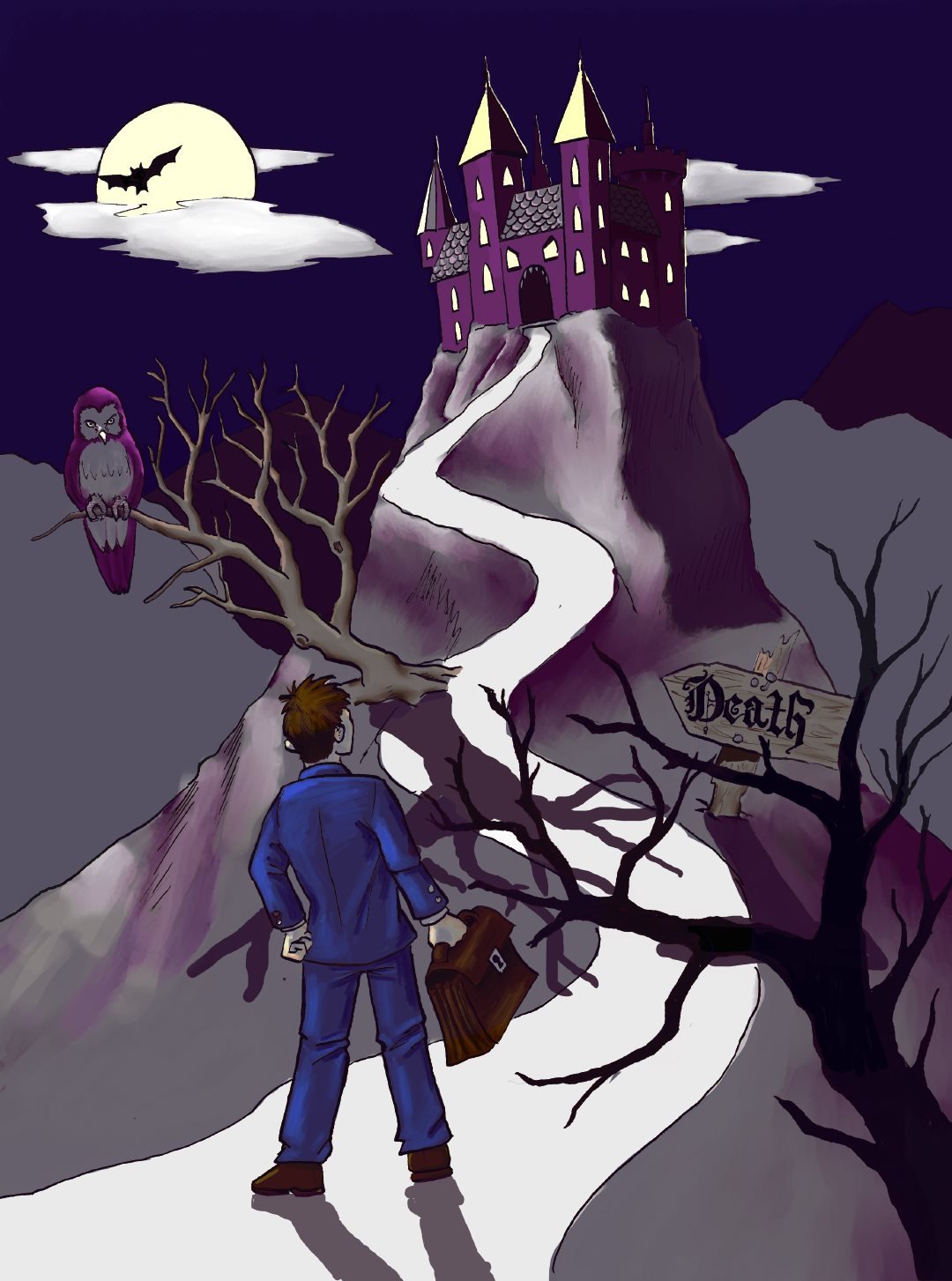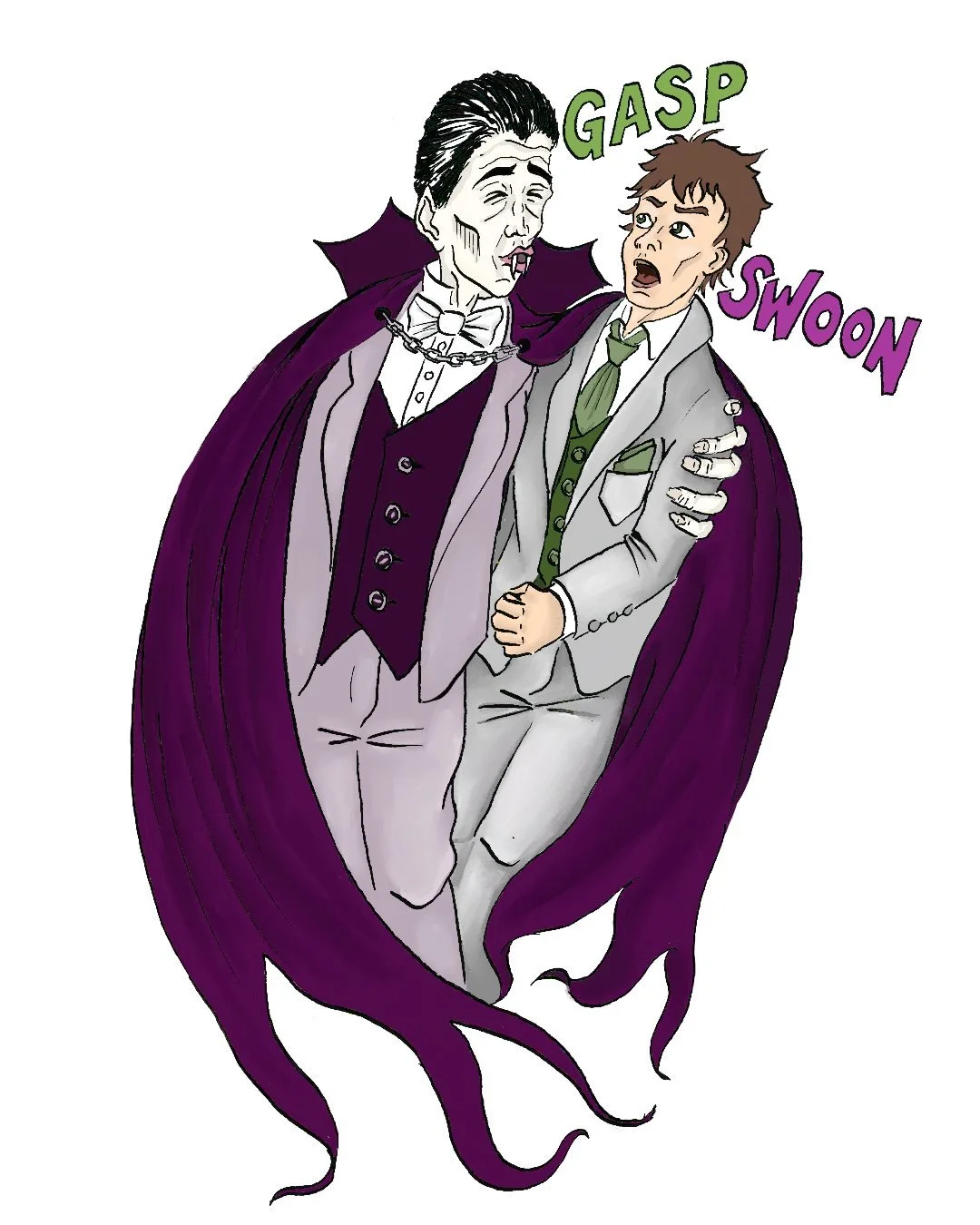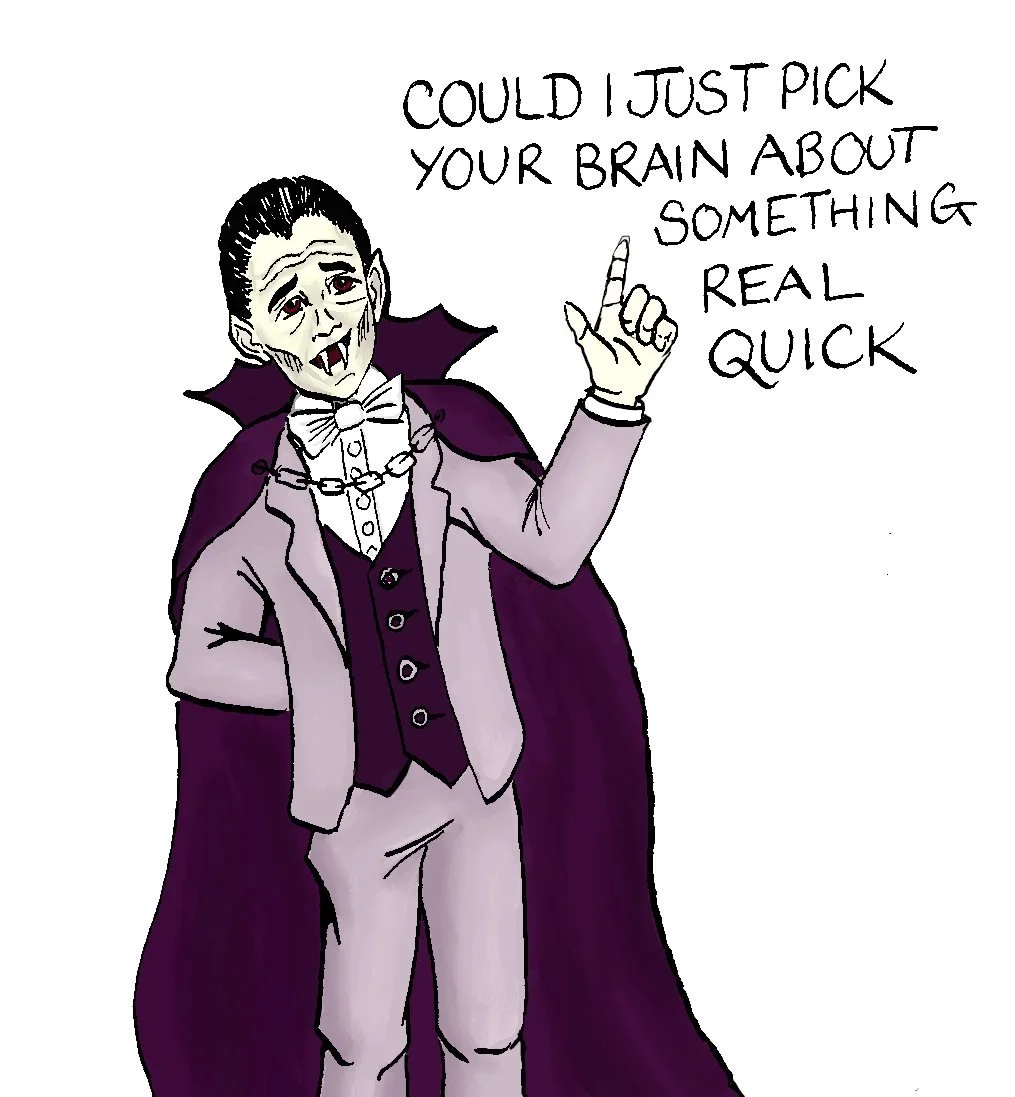LAW UP YER PLOT
All right, so consider Dracula. The original Dracula, before vampires got all twinkly and learned how to pout.
Why is Dracula so effective as a horror story? For my money, it’s the slowly mounting dread, from vague unease to electric tension. The Count isn’t a monster when he first appears. There are no evil mwa-ha-ha monologues, no showy eviscerations.
A lawyer contemplates a death castle.
No, we get to see the Prince of Darkness and Jonathan Harker in a cosy domestic menage. The locals are disinclined to work menial jobs at the vampire death castle, so Dracula has no choice but to act as Jonathan’s uber driver, housekeeper and personal chef. He picks up Jonathan at the railway station, cooks his meals, serves him coffee, and- in my personal favourite scene in the entire book- makes Jonathan’s bed. One can speculate about other duties Dracula performed for Jonathan that did not make it onto the printed page. After all, there is no way that Castle Dracula had modern plumbing.
Domestic responsibilities.
Absurd? Well, yes. But this is how we get all of those shivery little moments that gradually draw the nerves tight. Jonathan glancing in the empty shaving mirror that should show Dracula’s reflection, but doesn’t. Dracula’s offhand comment that he doesn’t drink wine. The sudden demon-light in Dracula’s eyes when Jonathan cuts himself and the blood trickles down. Then more and more, as the vague feelings of Something’s Wrong turn into a breathless, nameless delirium of fear, as Jonathan sees the coffins loaded for travel, sees Dracula creeping out of a window and down the sheer wall, sees a mother screaming at the castle door for her murdered child. All the while, Dracula keeps playing the polite and attentive host, and the thrum of sexually charged menace between him and Jonathan is enough to turn a person inside out.
This happens a lot while lawyering.
It all happens because they’re living together, you see. If Jonathan just happened upon Dracula mid-evisceration, you’d have a very different book.
And how does Bram Stoker lay the ground for this? How can he justify a bunch of scenes in which his undead fiend tosses salad for his victim, protects him from his demon brides, and (by implication) empties a whole lot of his chamber pots?
Because Jonathan’s a lawyer.
It’s so simple, really. Dracula’s moving to England and when he gets there, he can’t very well stow all his coffins in a train station locker. He needs a roomy place to crash. And to buy real estate, he needs to meet with a lawyer in person, because the law is anal about such things and even a Prince of Darkness needs to go through the red tape.
And after the real estate business is done- well, hell, it’s complicated to move to a whole new country. Dracula has a bunch of questions related to shipping and agency relationships between solicitors. He wants to ask them all before he eats Jonathan’s face right up.
“No, seriously, it’ll take five seconds.”
I love it, I really do. It’s such an effective answer to the question: Why can’t your villain kill your hero- or at least not yet? I am an absolute sucker for relationships between protagonist and antagonist, relationships that lead to shuddery suspense, games of cat-and-mouse rather than full-blooded conflict. And to get those, you need a reason that the villain can’t shoot the hero in the head during the first five nanoseconds of their saucy pas de deux.
In other words: why does the villain need the hero? All right, yeah, maybe they just want to kiss a whole bunch, but it’s good to have other options.
I will admit that I am biased, being a great big law nerd and all. But you can’t deny, the law makes excellent general-purpose plot fuel. In the fullness of its insistent uncompromising bitchiness, the law is always insisting that something just has to happen in a particular way, or that someone must do something that no sensible person would contemplate
Why, after all, does Jonathan toddle off to the death castle while wailing peasants beg him to run in the other direction? Because there are only limited circumstances in which lawyers are allowed to abandon the interests of their clients- and “the peasants were screaming” isn’t one of them.
Why do the Bennett sisters have to get married post haste? Because their father’s property is entailed, meaning they’ll be penniless when he dies. Why does David Balfour get kidnapped? Because he’s the rightful heir of an entailed estate and his wicked uncle can’t scheme or buy his way out of that implacable fact.
Why does Mary Lennox have to leave the country where she was born and hang out in a secret haunted garden with foxes and robins and shit? Because guardianship law makes her the responsibility of an uncle she’s never seen. Why does it matter that Jean Valjean used to be a convict? Because he broke parole, meaning Javert can drag him straight back to the galleys no matter how many little girls he’s rescued in the meantime.
Why doesn’t Mr. Rochester tell Jane Eyre the truth about the woman locked up in his attic? Bigamy laws. Why is Oliver Twist abducted from Mr. Brownlow? Inheritance laws. Why does Heathcliff insist on bringing up his son himself when he hates the kid? Marital property laws, in connection with a REAL complicated scheme that has Heathcliff playing matchmaker for two teenagers for years on end, just to make his romantic rival as miserable as possible.
I could go on ad nauseam. My beloved Wilkie Collins, who trained as a lawyer in part because he was so fascinated with the use of the law for crime, absolutely saturated his plots with this kind of thing. A man protects himself from an assassination plot through the cunning use of sealed directions deposited with a lawyer. A steely-eyed mother protects her naïve daughter from exploitation by a Real Bad Man through a cleverly drafted will. A Wicked Baronet locks his old girlfriend up in an asylum because she knows about the single document that could strip him of his entire fortune.
Are you intrigued? Are you inspired? Try it yourself, I dare- nay, I entreat you. Let’s have a book where callow Helen Hepplethwite needs to share a ghost-infested tower with a dashing lady woodworker for a year and a day, lest the terms of her eccentric aunt’s will cause her family’s mushroom farm be repossessed. JUST BECAUSE.





